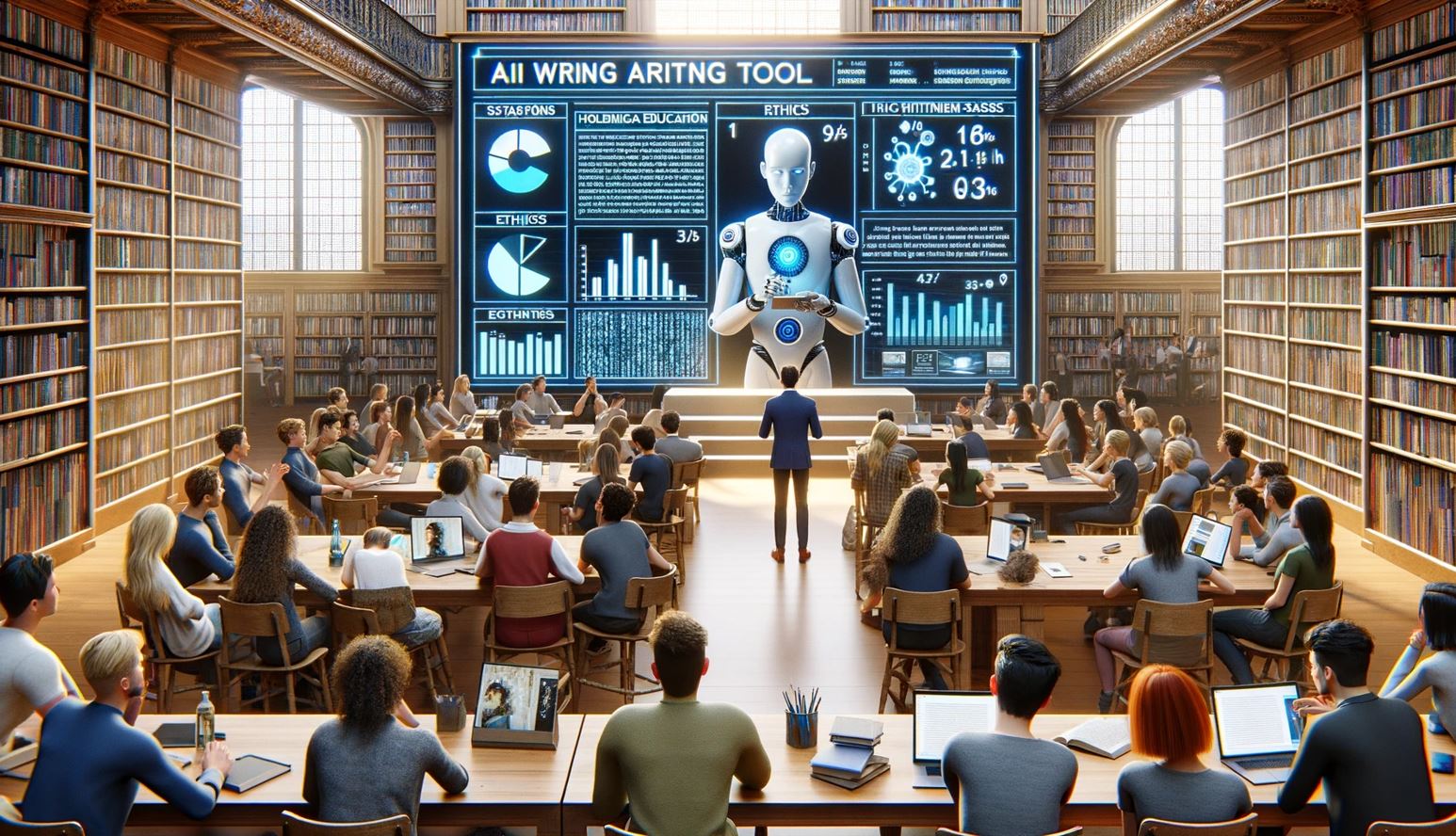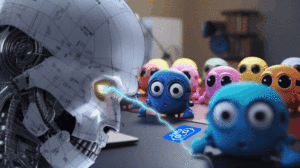Have you been caught up in the whirlwind of chatter about AI writing? Is AI writing cheating?
If you’ve paused to ponder whether letting a computer craft your prose is akin to academic taboo, rest assured, you’re in good company.
It feels like we’ve all stepped into some futuristic tale where gadgets are acing our essays for us – it’s quite the head-spinner!

Try these new AI-powered tools:
- 5 Best AI Detectors To Unmask AI-Written Content With Accuracy
- 5 Best AI Writers To Boost Your Productivity And Content Quality.
- This "Secret AI Writer" Can Bypass AI Detection Like A Pro.
I too have found myself mulling over this conundrum, trying to decipher right from fair play. Picture my surprise when I saw stats indicating a swarm of students have already given AI-powered tools a spin on their assignments—talk about shaking up the moral compass in education!
Donning my detective hat, I ventured through the labyrinthine world of AI writing to find out its true nature.
Consider this article your trusty guide cutting through the thicket: demystifying how AI penmanship ticks, juxtaposing its benefits with drawbacks (oh yes, both sides have merit!), and sparking a dialogue on how we can uphold honor without turning our backs on innovation.
Are you game for an enlightening jaunt? Let’s set forth—and who knows, by the time we circle back, we might unravel whether AI writing is more an ally than an adversary.
Article At-A-Glance
- Using AI for writing can help students work faster, but it might lead to essays that sound fake or cause students to learn less.
- Educators worry about AI helping with homework because it could be cheating. Some students think it’s okay as long as they’re learning.
- It’s important to use AI tools in a way that is honest and doesn’t just copy the work. Schools are trying to figure out rules for this.
- If we use AI too much, we might miss out on learning how to think for ourselves and solve problems.
- Finding a balance between using technology and keeping schoolwork original is key. Everyone needs to agree on how to do this fairly.
Table Of Contents
The Debate: Is AI Writing Cheating?
Here we are at the meaty part—facing off in the grand arena of ethical conundrums, where “Is AI writing cheating?” is the million-dollar question. You’ve got passionate educators on one side, clutching their red pens like swords, and on the other side, there’s a sea of students with glowing screens—their new-age shields.
Let’s dive deep into this debate without pulling any punches or getting tangled in academic jargon.
Examining The Ethical Implications
Let’s get real about the ethical side of AI writing. Some folks say using AI to whip up an essay is like having a ghostwriter—it does the heavy lifting while you take all the credit.
That sounds pretty dodgy, right? Imagine if everyone started doing that. It’d be tough to tell who actually knows their stuff and who’s just good at using tools.
Now, schools are scratching their heads trying to figure this out because ChatGPT and pals are making cheating a breeze.
Now, schools are scratching their heads trying to figure this out because ChatGPT and pals are making cheating a breeze. And let me tell you, it’s not just about getting caught anymore—it’s about what’s fair play in learning.
Guess we’ve got some thinking to do on how we keep things honest in class without throwing all these nifty tech toys out the window.
Perspectives From Educators And Students
Teachers and students are really split on the whole AI writing issue. I’ve heard more than one teacher say they’ve caught someone using a chatbot to cheat. It’s got them worried, you know? They’re all about honesty and learning for real, not just copying from a machine.
But half the students out there think it’s okay to let AI help with homework. It’s kind of like having a super-smart buddy who’s always ready to lend a hand.
I mean, isn’t school supposed to be about learning how things work – figuring stuff out on your own? So when I see that many classmates believe using AI tools doesn’t count as cheating, well, that makes me wonder where we’re headed. Seems like this debate is far from over.
Moving along here – let’s get right into understanding how this AI writing thing actually works.
Understanding AI Writing
Guess what? We’ve all been there – staring at a blank screen, the cursor blinking mockingly, as we’re trying to muster up something (anything!) coherent to say in our essays. And then, like magic, AI writing tools strut into the scene promising to make our lives easier.
Let’s take a deep dive and see how these virtual wordsmiths are transforming the way students craft their papers. Are they just a handy sidekick or is it more complicated than that? Stay tuned!
How Students Are Using AI To Write Essays
AI technology has changed how we do homework. Now, I can just type a question and get help from an AI to write an essay. Here’s how students are using it:
- They type in the topic of their essay and ask the AI for ideas.
- The AI gives them a bunch of information that they can use as a starting point.
- Some of them let the AI write the whole essay, then change a few words here and there.
- Others use the AI to explain hard things in easier ways so they can understand better.
- They check what the AI writes to make sure it makes sense with what their teachers want.
- Many times, they ask the AI for different ways to say something to make their writing sound better.
- They sometimes use AI to get a first draft done quick, then spend time making it their own.
- If they’re stuck, they ask the AI for help with just one part of the essay.
- The smart ones among them mix their own thoughts with what the AI says.
The Gray Area Of Plagiarism
Okay, let’s talk about that elephant in the room—plagiarism. You can compare it to that “Are we exclusive?” talk in a budding relationship. With AI writing tossing us into this gray area, it’s getting harder to tell what’s okay and what’s not.
Students now juggling between “I totally wrote that!” and “Well, my AI helper did sort of pitch in…” So where do they draw the line without stepping on their own toes or tripping over academic integrity?
Defining Plagiarism In The Context Of AI Writing
Plagiarism means taking someone else’s work and saying it’s your own. With AI writing, things get tricky. Some people wonder if using an AI to write is like stealing ideas from a computer brain.
You see, the traditional idea of plagiarism gets fuzzy when an AI churns out words – after all, who does the AI belong to?
Now we’re hearing about this thing called “AI-giarism,” where the line between original work and copy-paste gets even blurrier. It’s sort of like a new kind of cheating but with robots in the mix!
The question is: can words made by smart machines really be considered somebody’s property? That makes heads spin and has us thinking hard about what counts as fair play in schoolwork.
With these shifting sands under our feet, let’s dive into addressing concerns of originality and academic integrity next.
Addressing Concerns Of Originality And Academic Integrity
So, we’ve got this tricky issue with AI writing and whether it’s crossing a line into cheating. Let’s be real—when a computer spits out an essay, can we really call it original? Folks at schools and colleges are scratching their heads trying to figure this out.
Some people say that using AI is like having a super-smart buddy do your homework for you. But then again, isn’t the point of learning to think for yourself?
Now hear me out: It’s not all doom and gloom here. We’ve got these brainy types doing corpus analysis – that’s like detective work but for words – on university rules to make sure they’re up-to-date with the whole AI scene.
All in all, what we want is fair play — making sure everyone’s work is their own and keeping that good ol’ academic honor shiny.
All in all, what we want is fair play — making sure everyone’s work is their own and keeping that good ol’ academic honor shiny.
Moving forward from this topic takes us into another important discussion: how these smart-aleck AIs can actually help us—but also where they might trip us up.
Benefits And Limitations Of AI Writing
So, you’ve heard about AI writing tools and their promise of turning us all into prolific Hemingways—or at least saving us from the dreaded writer’s block.
But let’s be real for a sec: as much as these nifty little helpers can turbocharge our typing speed and spit out essays like there’s no tomorrow, they’re not without their quirks and hiccups.
Increased Efficiency And Productivity
Let’s talk about how AI writing gives us a big boost in getting things done. Imagine being able to write an article or essay in half the time it usually takes you. That’s what these smart tools are for! They help take your ideas and turn them into words faster than before.
This means you can create more stuff, whether it be blogs, reports, or school papers, without spending endless hours typing away.
I’ve seen firsthand how much quicker I can work with a little help from AI. It’s as if you have a super-fast assistant who never gets tired. Instead of struggling with what to say next, AI suggestions pop up and keep the ball rolling.
Sure, there might be some downsides to using this tech, but you can’t argue with the fact that it makes our lives easier when we’re on tight deadlines or just trying to juggle too many tasks at once.
Potential Drawbacks And Limitations
So, AI writing tools can be super helpful, right? But they’re not perfect. Sometimes essays written by AI can sound really stiff and fake. It’s kind of like you can tell a robot wrote it instead of a person who has real feelings.
This means the stuff we write might not always resonate deeply with people’s hearts, which is super important when telling stories or trying to get someone excited about an idea.
Plus, using these tools for schoolwork has its own set of problems. Teachers want their students to learn and think on their own, but if AI does all the work, are they really learning anything? There’s this big worry that students might pass off AI work as their own and that’s definitely not cool—it’s actually cheating.
Being honest in school is a big deal. Without it, students could end up with some serious trouble like failing classes or even getting kicked out!
But we’ve got to keep moving forward and talk about how this all shakes out in real life.
The Key Is To Find Balance
In wrapping things up, it’s pretty clear that the whole AI writing situation lands us smack-dab in the middle of a debate that’s not going anywhere soon. It’s about striking the right chord, you know—mixing these high-tech helpers with our own brain juice to keep things honest and genuinely educational.
Let’s dive into how we can keep both the tech-wizards and old-school scholars nodding along in agreement.

Encouraging Responsible And Ethical Use Of AI Writing Tools
So, we’ve got these AI writing tools, right? They’re super handy and can whip up an essay in no time. But here’s the thing – just because they’re fast doesn’t mean we should throw out the rule book on honesty.
We need to use these tools wisely and in a way that’s fair. I believe in setting some ground rules for using AI ethically.
We need to use these tools wisely and in a way that’s fair. I believe in setting some ground rules for using AI ethically.
Now, imagine you’ve got guidelines that tell you how to use AI without stepping over the line into cheating territory. You’d still learn a lot and wouldn’t cut corners, right? That’s why it’s important for everyone—students, teachers, even professionals—to come together and make sure these cool techy helpers don’t lead us astray from learning.
Let’s tap into our smarts as much as we tap on keyboards!
Got all that? Good! Now let me tell you about something else: walking through what plagiarism means when robots are doing part of the writing.
Emphasizing The Importance Of Critical Thinking And Learning
Let’s get real – just having a tool doesn’t make you a master carpenter, right? Same goes for AI writing. It’s as if I’m handing you the hammer. It doesn’t build the house unless you know where to hit the nails.
That’s why we can’t forget about good old critical thinking and learning. Trust me, knowing how to think on your feet sets you apart in a world where everyone’s got gadgets and gizmos aplenty.
You’ve gotta dig deeper than ever before—analyze info, sort out what’s legit, create your own spin on things. And this isn’t just for kicks—it truly matters. In school or in life, being able to pick apart an argument or see through the fluff is key.
Our brains need to stay sharp as we team up with AI so our work shines with originality and smarts—not just something spit out by a bot without a second thought!
FAQs
1. Is using AI to write your school essay a no-no?
Yeah, that’s cheating—like having a robot do your homework for you.
2. Can I get in trouble for turning in an AI-generated report at work?
You bet! If you’re caught, it could be bye-bye job.
3. What if I just use AI to give me ideas and then write my own stuff?
That’s usually okay—it’s as if you’re asking a friend for advice and then doing it your way.
4. Will people be able to tell if I used an AI to write something?
Pretty likely—they’re clever but sometimes they sound kind of robotic, you know?
5. Are there any times when it’s totally cool to use AI writing tools?
Sure thing—if everyone knows and nobody minds, go ahead and let the bots loose.
Meet our resident tech wizard, Steve the AI Guy. Now, before you get any wild ideas, let’s clear up one thing – he’s 100% human! I mean, he’s got the work history to prove it. He spent a decade diving into the deep end of the tech industry doing business intelligence work, splashing around with two of the world’s largest business consulting companies, Deloitte and Ernst & Young. Learn More










